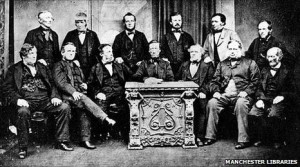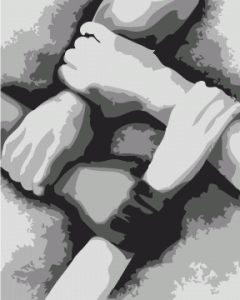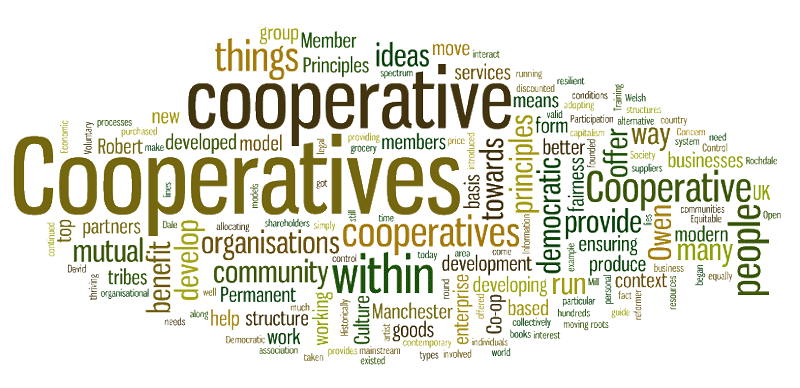“Every kind of peaceful cooperation among men is primarily based on mutual trust and only secondarily on institutions such as courts of justice and police.” – Albert Einstein
What are cooperatives?
Cooperatives are businesses organisations that are owned and run by a group of individuals for their mutual benefit. Within a legal context they are an association or corporation established for the purpose of providing services on a non-profit basis to its shareholders or members who own and control it. Cooperatives exist for all types of reason, to provide housing, food, and energy to running businesses such as bookshops to artist cooperatives and beyond.
How did they come about?
 Cooperatives have existed in some form or another ever since human beings began to organise themselves for their own mutual benefit, many tribes organised themselves along cooperative lines as a means of securing resources and allocating work within their particular group or community. These cooperative structures were then used when trading with other tribes and communities within the locale as a means of ensuring fairness.
Cooperatives have existed in some form or another ever since human beings began to organise themselves for their own mutual benefit, many tribes organised themselves along cooperative lines as a means of securing resources and allocating work within their particular group or community. These cooperative structures were then used when trading with other tribes and communities within the locale as a means of ensuring fairness.
Cooperatives within a historical context
The idea that people that should form into groups for their own mutual benefit was further developed by the Welsh Social reformer Robert Owen, who in 1810 got together with his partners and purchased a Mill from his Father-in Law David Dale.
From this point onward Robert Owen and his partners introduced better work conditions for their workers and offered them discounted goods via their retails shops, as well as sharing the profits from sales amongst the employees. Owen continued to develop these cooperative ideas through writing books and travelling round the UK doing lectures to promote these new ideas.
Further to this, in 1844 the first cooperative enterprise was developed when The Rochdale Society of Equitable Pioneers was founded. Historically this enterprise was taken as the model to develop further Cooperatives and is the basis of the modern Cooperative Movement that we have today.
A working cooperative in action
There are dozens of cooperative up and down the country that offer a variety of goods and services. An obvious example of a fully working contemporary cooperative that is very prominent within the wider Market framework is the Cooperative, known by many simply as the Co-op. The Co-op boasts over 6 million members and provides employment for over 110,000 people across the UK.
At the other end of the spectrum there are smaller grass roots community run cooperatives both here in the UK and all over the world, and this seems to be something that is gathering momentum due to the workers valued involvement and input, the social investment, and the general resilience of cooperatives compared to Market place models of trading and producing goods.
What is encouraging within a UK context is that there are many medium sized and smaller cooperatives that focus on food and the distribution of food, such as the Suma Whole food Coop, Organiclea in London, and Manchester Unicorn Cooperative grocery, to name but a few. These cooperatives provide healthy organic and ethically sourced produce for people all over the UK with Suma, and across Manchester and London, and are thriving; they are thriving because they have developed links with the local community whilst at the same time ensuring that suppliers are paid a fair price for their produce.
How can cooperatives help to develop a permanent culture?
Cooperatives are an important organisational structure as we move towards the development of a Permanent Culture and away from the temporary exploitative short term ‘quick buck’ approach of free Market economics and Neoliberalism.
There importance lies in the fact that they are run collectively and mutually, and because of this Cooperatives are much more resilient and people centred than a top down structure where those at the top make decisions based on their personal interest as opposed to the interests of all of those involved in the business or organisation. If we examine the underpinning principles below that govern and guide the modern cooperative we can see that these principles embody a great many of the things that we need to bring about a Permanent Culture, such as inclusivity, equality, fairness, access and participation to democratic processes.
Cooperative Principles
Principles – Voluntary and Open Membership
Democratic Member Control
Member Economic Participation
Autonomy and Independence
Education, Training and Information
Cooperation among Cooperatives
Concern for Community
Cooperatives offer a way of developing new organisations that provide for people’s needs based around different principles to mainstream capitalism. They allow development of organisations that are accountable and democratic and even though they have to interact within a market system they still offer an alternative way of doing things. They are just one model of doing things and there are others which are equally valid. By adopting these models of operation, people are moving towards more sustainable and democratic way of doing things and that can only help move towards a better world.
Cooperatives, have the ability to embody and put into practice the ethics of Permaculture in a way that other models of trading and production such as Capitalism are unable to due to external forces and vested interests, this is vitally important if we are to have a sustainable and ecologically sound future where inequality and exploitation are removed from our trading interactions.
An important to thing to consider as we look back through our relatively short human history is the fact that human beings have created a dynamic and diverse world through the collective effort of people, as opposed to individuals. It might well be the case that individuals have been responsible for what we perceive as human innovation in terms of invention and development, but without the collective effort to develop and produce these innovations they would simply not exist other than in the mind of the inventor or innovator. In nature, all is cooperative and interdependent, this is something that has been lost to us to our detriment due to the mistaken believe that individualism is the driving force of humanity.
Within a possible permanent culture we are all valued parts of developing our own ethical future, it is left to individuals then we can only expect to see more greed, more self interest and more division, because without division individualism and the self interest that it perpetuates would simply collapse.
“The only thing that will redeem mankind is cooperation.” – Bertrand Russell

